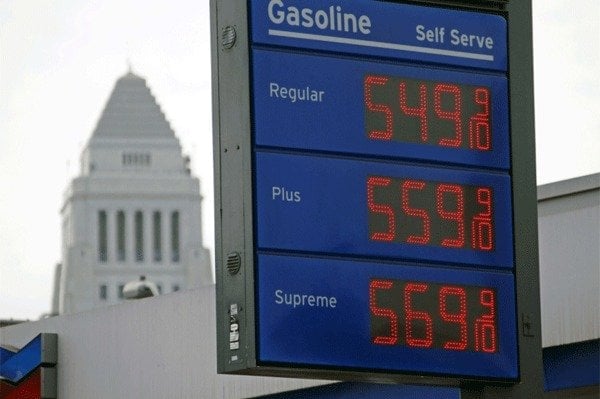 If there’s one industry that has free rein in California, it’s the refinery business. California doesn’t regulate supplies of gasoline, so refineries here only keep around ten days on hand, instead of the more than three week supply most refineries do in other states. We’ve only got 14 refineries here making gasoline, down by half from a few decades ago. Over the last decade, Californians have consistently paid prices that are 10 to 20 cents a gallon higher than the rest of the nation. We don’t tell refineries how much gas they’re allowed to export and export they do—to Mexico and Canada, among other places. So, when the system hiccups due to refinery fires, power outages, and routine maintenance refineries don’t bother to stagger, it’s consumers that end up staggering from sharply rising gas prices as traders panic and independent stations get stuck holding an empty bag.
If there’s one industry that has free rein in California, it’s the refinery business. California doesn’t regulate supplies of gasoline, so refineries here only keep around ten days on hand, instead of the more than three week supply most refineries do in other states. We’ve only got 14 refineries here making gasoline, down by half from a few decades ago. Over the last decade, Californians have consistently paid prices that are 10 to 20 cents a gallon higher than the rest of the nation. We don’t tell refineries how much gas they’re allowed to export and export they do—to Mexico and Canada, among other places. So, when the system hiccups due to refinery fires, power outages, and routine maintenance refineries don’t bother to stagger, it’s consumers that end up staggering from sharply rising gas prices as traders panic and independent stations get stuck holding an empty bag.
Right now, California gas prices are falling, but what goes down can come back up again. The average price of a gallon of regular here now costs $4.16, down 26 cents or so since a week ago. But just wait until Hurricane Sandy works itself through the system. Buyers are already bumping up the price of gas futures on the New York Mercantile Exchange. If California’s Attorney General and the Federal Trade Commission let Tesoro and BP close their deal, we’ll really be in fine fettle. Chevron already controls nearly 28 percent of California’s gas market. Together with a newly reconstituted Tesoro, the two will control 54 percent of the market. It’s not rocket science to think that these companies might want to undercut competitors and then cut supplies to raise prices. Get ready for the new normal: $5 dollar a gallon gas.
Add to that the fact that refineries like Chevron never pay the real price for the pollution they cause. That’s because regulators prefer not to sanction companies contributing many millions to the tax base. It might make lawmakers sensitive to the campaign checks big companies write a little bit angry. No one signs off on refinery maintenance. When Chevron’s Richmond plant erupted in flames and sent a toxic cloud of sulfur dioxide, sulfuric acid, and nitrogen oxide spewing over the community, the Department of Toxic Substances Control, which has jurisdiction, refused to step in. Never mind that 15,000 people went to the hospital with eye and breathing problems. Instead, its chief counsel deferred to the Bay Area Air Quality Management District. The DTSC is good at passing the buck.
Trouble is air district regulators in the Bay Area and on the South Coast have cited Chevron dozens of times for air violations, but the fines are a joke. Records show the South Coast Air Quality Management district cited Chevron 18 times for air pollution between 2009 and 2011. Only three instances resulted in fines of up to $25,000, a pinprick on the hide of an elephant with $29 billion in profits. BP has been cited 24 times between 2009 and 2012. They paid fines only five times.
No California regulator seems up to the job of regulating refineries. In the case of Chevron’s Richmond fire, the EPA has launched a criminal investigation after discovering Chevron detoured pollutants around monitoring equipment for four years. According to the San Francisco Chronicle, workers complained to regulators that unchecked corrosion at the plant of the sort suspected in the August blaze was responsible for another fire last year. A federal audit of CAL OSHA’s industrial process safety unit found that the division was conducting few if any comprehensive workplace safety inspections of refineries in the state. The Federal Chemical Safety Board is now investigating the fire but has no power to punish.
So, take a deep breath and realize California consumers and their communities just aren’t a top priority.
